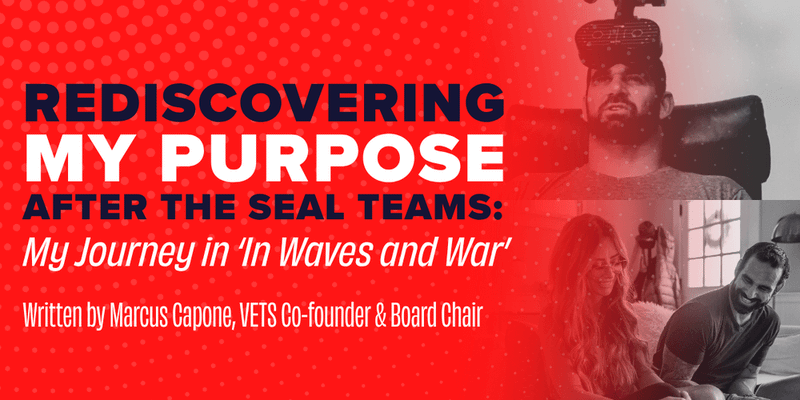By Marcus Capone, Co-Founder, VETS
I spent 13 years on active duty as a Navy SEAL. I operated with SEAL Team 10 and SEAL Team 6, taught at BUD/S, and ran Close Quarters Combat for SEAL Qualification Training. That was my world - high-performing teams, structure, intensity, and clarity of mission.
Then one day, it all ended. And I wasn’t prepared for what came next.
Like a lot of guys coming out of the military, I didn’t recognize how much I was carrying until I got home and everything started to fall apart. I couldn’t sleep. I was on edge all the time. My brain didn’t feel like it worked right. I was anxious, disconnected, short-tempered, and exhausted. And all the things that used to make sense - family, career, life in the civilian world - suddenly didn’t.
I didn’t talk about it much. I figured I could outwork it or wait it out. I tried what I was told to try: therapy, medication, brain clinics. I was prescribed a mix of SSRIs, sleep aids, and meds for nightmares and fatigue. It was a full cocktail of pharmaceuticals that maybe numbed things, but never really fixed anything. And over time, things got worse.
I didn’t want to die - but I didn’t want to keep living like that, either.
The Breaking Point
Eventually, things got bad enough that my wife, Amber, stepped in. She was watching me fade out of our family. And while I wasn’t saying the words out loud, she knew what I was thinking.
She found what would eventually become our mission - VETS - Veterans Exploring Treatment Solutions. Back then, it was just a lifeline to something different. A new option. A possible reset button.
That’s when I learned about ibogaine.
I had never heard of it. I didn’t know what a psychedelic was, let alone what it could do for trauma. At first, I thought it sounded like total nonsense. But once I started reading the science, listening to other veterans’ stories, and seeing that this wasn’t just some fringe idea, I agreed to go.
The Treatment That Changed Everything
I flew out of the country for treatment. It wasn’t legal in the U.S., and honestly, that felt wrong. But I was willing to do whatever it took.
Ibogaine isn’t a recreational drug. It’s intense. It hits hard and fast, and it forced me to look at everything I had buried - memories, guilt, shame, fear. That night was the hardest thing I’ve ever done, but it cracked something open. It made space for healing. And by the next morning, I felt like a weight had been lifted off my chest for the first time in years.
It wasn’t instant peace. It wasn’t perfection. But it was a turning point. And it gave me the clarity I needed to start rebuilding my life.
Putting It All on Camera
Sharing that experience in In Waves and War , the Netflix documentary about veteran healing, wasn’t easy. You’re seeing the worst moments of your life, laid out in front of a camera crew. You’re reliving pain you thought you had outrun.
There were parts I didn’t want to say out loud. Things I didn’t want my kids to see or my friends to know. But Amber and I agreed - if we were going to do this, we were going to do it honestly. No filter.
The documentary shows what it’s actually like behind closed doors for many veterans and their families. Not just the combat, but the aftermath. The disconnection. The fear. The emotional landmines that ripple through a marriage and into fatherhood.
There’s a moment in the film where I talk about not being the husband or dad my family deserved. That moment still gets me. But it was real. And I wanted other people to see it, because I know I’m not the only one who’s been there.
Why Psychedelic Therapy Needs a Seat at the Table
I’m not saying psychedelics are a magic bullet. They’re not. But they deserve to be in the conversation. These therapies go deeper than traditional approaches. They get to the root of trauma. And for many veterans, they’re the first thing that’s worked.
Ibogaine saved my life. Full stop. And VETS was born from that experience - to help others access the same chance at healing, with safety, support, and dignity.
We’ve supported hundreds of veterans since then, and we’re just getting started. But here’s the problem: access is still limited. Most Americans can’t pursue these treatments unless they leave the country or break the law. That has to change.
If we’re serious about preventing veteran suicide, we need to give people every tool that works—not just the ones that fit inside the box.
What Comes Next
Eight years ago, I was in a dark place. Today, I’ve got purpose again. I’m working every day to expand access, shift policy, and help other veterans find the same breakthrough that I found.
In Waves and War is part of that mission. So is VETS. So is every veteran who’s willing to speak up and say: “I need help.”
We’re not done. Not even close.
This is just the beginning.

